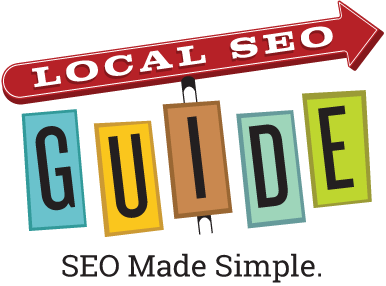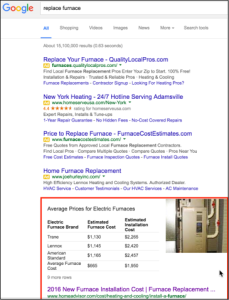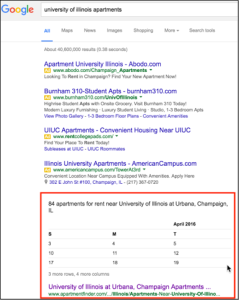Per my previous post, Are You Doing Local Answers SEO?, we have noticed these types of results are becoming more common for queries that have local intent:
Click to enlarge these sorry screenshots
This is in line with the increasing presence of Knowledge Graph results over the past year. We believe that Google is starting to view many local queries as “questions” (as opposed to “searches”) and it is trying to provide answers whenever possible. Over time, we see SERPs for local category queries moving towards becoming comprehensive landing pages for everything one would want to know to find and hire a local service pro, find something to buy at a retail location, etc. Mike Blumenthal recently asked Is The Future of Local Search Packless? We would go a step further and posit that the future of local search may in fact be “resultless”. In other words, Google will be able to aggregate all of the data from various relevant web pages and display it on a single SERP in a coherent manner that quickly helps the searcher find what they need.
In the “replace furnace” example, imagine a SERP that contained the following:
- A list of top-rated furnaces and prices aggregated from multiple sites that rate and review furnaces
- A list of top-rated local HVAC providers with their average ratings & reviews from multiple sites and their average price for replacing a furnace. A “Contact Now”, “Get a Quote” or “Book Appointment” button would appear next to each.
- Popular videos about how to replace a furnace
- Articles about how to choose a HVAC contractor, replacing furnaces, etc.
- Information about permits required by your city to do HVAC work
In many ways Google’s SERPs already provide this data, but it’s typically displayed as the standard list of links. These Knowledge Graph results show that Google is moving rapidly towards displaying much more customized SERPs. As Googlers often say, they are trying to get searchers the best answers to their queries as fast as possible.
In this new SERP=Answers paradigm, we believe publishers will need to focus on:
- Insuring Google understands its content. Using schema mark-up and standard SEO best practices will likely help.
- Baking structure into everything you publish. Schema may not be enough. For example, the content on the HomeAdvisor URL that ranks for “replace furnace” is highly structured – the content is broken down into “chunks” that target various queries, the data on the furnaces is displayed in a well-organized table, anchor links help differentiate the different sections, etc. At some point Google will be smart enough to understand this stuff without structure, but at the moment it appears it needs a lot of structure to get it right.
- Improving user engagement with its content. Google will likely constantly test new content from competitors to see how it performs v. yours.
- Prioritizing content that best answers the question is critical. As you can see from the “University of Illinois apartments” query screenshot above, Google is showing irrelevant calendar data in the Answer Box. We believe this is because on the ranking URL the closest structured data to the text that matches the query is a calendar in the “Contact” pop up from the first listing – See my post on SEL for more on this. This MyApartmentMap.com URL also generates a similar result with listings content in the grid because they display a basic table with relevant content near the text that matches the query. We think this is a signal that the standard Local Directory SERP list of business listings (e.g. DUI Attorneys in Pleasanton, CA) needs to be rethought. It needs to become a highly structured collection of the most important information a consumer needs to make a decision.
In other words, your typical Local Directory SERP is going to have to be better than what Google can cobble together by looking at you and all of your competitors’ sites. We have long wondered why Google ever shows links to undifferentiated Local Directory SERPs in its results. Once it nails the formula for creating a great Local Answers SERP, it’s hard to see how any Local Directory site without a great set of answers itself is going to get ranked.




9 Response Comments
You wrote it well Mr Andrew
Google greatly focusing on local results and semantic analysis of the data. google is getting more accurate nowadays.
It’s also interesting in the context of the feverish hyperbole emerging on “commercial conversations” – message-based exchanges between real people and smart bots. Google certainly has the brain trust to be one of the smarter bots to be asking questions casually inside message experiences… Whether it has the “social skills” is an entirely different conversation!
It’s one thing to beat a human being at Go where the rules and possibilities are well-defined, but I see all these conversational bots choking when I need to figure out something a bit more nuanced, such as whether or not I need to replace my furnace or just repair it. It turns out three different HVAC contractors + the gas company said I should replace it, while someone who had zero incentive other than my satisfaction recommended we repair it, which took about 30 minutes. If my house doesn’t blow up in the next few weeks, I am going to be bearish on commercial conversations.
Yes, thus the “feverish hyperbole” POV.
There’s a few variations on conventional tools that really make sense to me, but seeing early examples like this one from a supposed bot visionary is just laughable. Boils a haircut decision process down to “who can cut my hair nearby now”. https://medium.com/assist/you-need-a-haircut-e96190d59f34#.97xpy3kew
If it’s on Medium, it’s visionary by definition…
What I don’t like is Google trying to take over the SERP by mining the most important data from the results. Yeah, they source it, but it take away the traffic and much recognition from those who actually provide it.
Also, it’s all these little complex updates from time to time that makes it hard for businesses to keep up and continue doing all the right things to maintain rankings they’ve worked so hard for and deserve. Especially the small businesses that don’t have the money to have someone on this full time or hire some big agency to keep up with it for them. There are some agencies that cater to smb’s, like http://www.yellowpagesdigital.com, but those are much fewer and harder to find for all the local establishments out there. Local SEO is something I wish Google would get right and stop playing around with so much. The whole Google + fiasco is a prime example.
Very interesting, thanks for the post. I wonder if a local furnace business would ever have enough domain authority get a price chart like that to show. I imagine local prices would much more relevant than national average.
I’m also disappointed to hear that 3 contractor you had personal referrals for did nothing more than push the most expensive option. Time to improve your referral sources 🙂
I am guessing at this point GOOG doesn’t consider “replace furnace” as a local query. If you look at the Related Searches links at the bottom of the SERP, you’ll see a few that mention “cost” or “price”. This is a clue as to how GOOG is translating the query. If you start to see city names in there then it might work for a local guy.